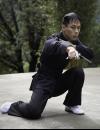Meet the Author: Marisa Cranfill (YOQI) Interview About Qigong for Immunity (video)
January 10, 2022
YMAA Staff Writer Gene Ching interviews YOQI master Marisa Cranfill about her blend of Yoga and Qigong and how to practice to boost the immune system.
Qigong Flow to Boost the Immune System
April 5, 2021
With the COVID-19 virus pandemic, understanding the immune system has become an important topic of healthcare and self-care. The immune system is an intelligent matrix of biological structures and processes that protects your body against pathogens like bacteria, viruses, parasites and fungi.
Tai Chi Seated Workout
March 1, 2021
Tai chi master teacher David-Dorian Ross has taught for years a seated "Healthy Back" routine that can be practiced by anyone, at any age or fitness level. It allows students to gradually experience pain relief, and develop flexibility. Seated tai chi and qigong exercises stretch and strengthen your back, taking pressure off the spine and muscles, so that you can ease into essential tai chi and qigong postures for alleviating pain and create better structural integrity. Sitting tai chi is actually an ancient practice going back centuries.
Tai Chi for a Healthy Heart
February 22, 2021
Mind-body exercises, such as tai chi and yoga, have been gaining popularity over the past few decades. This is not surprising, given the increasing number of studies on the positive effects of these gentler forms of exercise—everything from lowering blood pressure and managing depression to building strength and improving balance. There is even evidence that tai chi may help you live a longer, more vital life.
Tai Chi for Women
February 1, 2021
Women, more than men, need a workout that both strengthens the bones and calms the immune system. Women are far more susceptible to autoimmune diseases than men, including multiple sclerosis (MS), arthritis, lupus, fibromyalgia and psoriasis. Women are also more at risk for thinning bones as they get older, at a time they are more likely to fall.
YOQI: Qigong for Winter
-
December 21, 2020
Physically, winter qigong practices focus on the organs of the water element: the kidneys and the urinary bladder. In the Five Elements Phases of Traditional Chines Medicine, winter expresses the water element. In your body, the water element particularly affects your kidneys, urinary bladder, fluids, spinal cord, bone marrow and brain.
Qigong Flow For Happy Organs - Part 2
-
November 2, 2020
Qigong Flow for Happy Kidneys is a complete routine designed to balance and nourish the kidneys and urinary bladder. In traditional Chinese medicine, the kidneys resonate with the water element and the spirt of willpower. Happy kidneys are the key to energetic stamina, sexual potency, and longevity. They not only regulate the body fluids and filter the blood, but they are also considered the energy batteries of our body. The kidneys store yuan qi, the precious gift of innate qi inherited from our parents.
Qigong Flow For Happy Organs
-
October 26, 2020
Qigong is a meditation in motion that balances the energy aspect of your being for healing, health, and vitality. The YOQI style of qigong, called Qigong Flow, is the art of energy cultivation through one continuous stream of body-based awareness that alternates between stillness and movement, yin and yang.
YOQI: Qigong for Autumn
-
October 12, 2020
Autumn is the time of year when nature is letting go. Leaves are falling, earth is tilling and going inward preparing for winter. So it's a good time to support our own energy and fortify the immune system. Spiritually, it's a special time to ask ourselves who we are and release anything that is preventing us from expressing our authentic selves.
Release Anxiety, Stress and Tension with Qigong
-
August 17, 2020
One of the greatest contributions of Traditional Chinese Medicine is the understanding that the state of our health is linked to the state of our emotions. We intuitively know that stress, anger, worry, grief, and fear have a direct effect on our body and our perception of life. For example, fear-based emotions stimulate the release of one set of chemicals while love-based emotions release a different set of chemicals. To achieve harmony and wellbeing, a fundamental aspect of qigong training is to transform negative emotions into positive virtues.
Qigong for Summer – Transform Impatience and Anger into Patience and Compassion
-
June 17, 2020
Energetically, summer is also a powerful time for transforming energy. The element of summer is fire. In our body, fire connects to the heart fire that resonates the human force of unconditional love and acceptance. Therefore, many qigong practices for summer come from spiritual qigong traditions that focus on internal alchemy; the process of transforming and refining our vibration to its highest potential.
Qigong for Spring—Support the Liver and Expand Your Vision
-
June 1, 2020
Physically, spring qigong practices focus on the organs of the wood element: the liver and the gall bladder. The liver is the chief organ responsible for processing toxins in the body. One of the liver's main jobs is to store the blood and filter toxic wastes from the bloodstream. Another task is to produce many of the alkaline enzymes upon which immune response and other vital functions depend.
Radiant Lotus Qigong for Women
-
March 6, 2017
Throughout China, Japan, India, Egypt and other Eastern countries, the beautiful lotus flower is famed for its ability to grow in muddy, stagnant waters, absorbing what is useful and releasing what no longer supports its optimum health. Amidst challenging conditions, it breaks through the darkness to bring light, beauty, strength and grace to our world.
Preparation for Beginning a Tai Chi Sequence
-
January 5, 2017
Before you begin the sequence it is good to stand in wuji for a moment to focus your intent and your qi.
Experience Tai Chi Fitness
-
October 10, 2016
Tai Chi Fit is a unique workout that I have developed after decades of traditional tai chi (taijiquan) practice. It is an effort to make tai chi more fun and accessible, while making your fitness more graceful and holistic. It’s a ride along the wave of your inner power, like surfing on your own life energy (Qi).
Introduction of Yang Style Lao Liu Lu Taijiquan
-
August 8, 2016
In the time of Qing Dynasty, taijiquan was quite popular in the royal palace due to Prince Pu Lun Bei Zi, a man of great power and wealth, who appreciated the fighting technique of Yang-style taijiquan. He recognized the martial applications disguised in the slow, graceful movements, as if there were needles hidden, wrapped in cotton.
Taijiquan and Buddhadharma
-
May 30, 2016
The three dharma seals in Buddhadharma: impermanence, non-self, and nirvana. In the sutras it is said that whatever is phenomenal is impermanent, everything is of non-self, and nirvana is perfect tranquility.
24 Hours of World Peace—Celebrate World Tai Chi & Qigong Day
-
April 20, 2016
David-Dorian Ross, an acclaimed international tai chi teacher, has worked for decades to bring tai chi to the mainstream. Ross is also a recipient of eight US Gold Medals, a World Silver medal and two World Bronze medals in tai chi. Now he is taking instruction to the next level by offering to the tai chi community the first interactive online streaming video.
Sai Design and Fighting Theory
-
January 27, 2016
The correct length and weight of the sai varies from individual to individual. Of course, as with any weapon, the longer and heavier it can be without compromising the handling, the better it is in a combat situation. As the proverb goes, "One inch longer, one inch stronger" (一寸長, 一寸強, Yī cùn cháng, yī cùn qiáng).
Sai: Ancient Marvel of a Weapon
-
December 7, 2015
Sai (釵, chāi) is perhaps most commonly known in popular culture today as the featured weapon of choice by the comic book characters Raphael of Teenage Mutant Ninja Turtles and Elektra of Marvel Comics. While it is not entirely clear how the sai was created as a weapon, it is widely accepted that the sai originated from mainland Asia several thousand years ago.
Safety In Practicing Taijiquan
-
August 10, 2015
Is there a safety issue for practicing taijiquan? Yes. I occasionally listen to a program on learning taijiquan while in my car. A host once asked his guest (a famous master of taijiquan), "What physical conditions are required for learning taijiquan?" The guest answered: "You can learn taijiquan as long as your knees are fine."
On Practicing Taijiquan—The Five Mindsets
-
June 29, 2015
Many people are aware that taijiquan is beneficial, but to obtain those benefits one needs "samutpada" (arousal of earnest intention) and one has to pay the price. Everyone can afford it, but most people are reluctant to pay. Whenever I run into taijiquan enthusiasts who want to practice taijiquan with me, what I first say is, "If you want to learn taijiquan you need to pay the price.
Mind Approach in Practicing Taijiquan
-
June 22, 2015
The Mind Approach in Practicing Taijiquan. The mind approach is a way of practicing with one's heart (mind and intent) as the guidance. It used to have no fixed patterns or rules; however, the mind approach I present has its principle based on the following six points.
Grandmaster Li, Mao-Ching (李茂清)
-
March 29, 2010
Grandmaster Li, Mao-Ching (李茂清) was born in Qingdao city (青島市), China, on July 5, 1927. He first began training martial arts in 1934 when he was eight years old, under the instruction and guidance of his father and his cousin Shang, Huan.
Insights into Modern Day Martial Arts Training
-
February 17, 2009
Training does have to be adjusted and changed for modern day, but the principles and essence should remain the same. We are constantly striving to preserve the teachings of our masters, and we should be very cautious when to modify them.
























